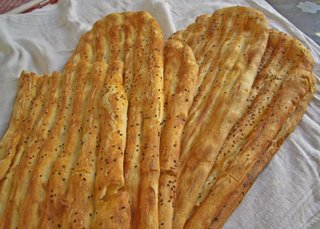Thursday Night at the Bakery
I'm sitting on the step in the last of the evening light, waiting in a queue of around five. It’s mostly men in the evenings, wives will be at home preparing dinner. It’s also the first day of the weekend, so tonight, demand for fresh “naan sangak” - a wholesome flat bread cooked on hot pebbles - is high.

Little brother scoots past my knees carrying a bundle of separated newspaper pages, ready for customers to grab to wrap their hot bread. The family business starts from the littlest one up on this Thursday evening shift. Inside, a boy not much older retrieves the cooked bread on a spatula as it appears on the revolving stone plate which carries them through the oven. The lad’s stout frame suggests he’s the older brother of the chubby little newspaper boy. His advantage in years puts him one step closer to the production end of the family business.
At peak times you won’t find a single Tehran bakery without waiting customers spilling into the street outside. Mass-produced bread is available at supermarkets but the reaction at home when you bring back a still-warm armful from the local bakers’ speaks of a link between man and his staple food that plastic packaging somehow comes between.
There’s a dull clang of wood on metal as the twenty-year-old baker’s apprentice drops the long palette handle into its holder. Even before it stops rattling his hands are in the aluminium trough to grab another slick, wet pat of dough. He’s the hard-running fly-half of the operation, the living link between the raw stuff and the furnace. If he wants to run his own bakery one day he’s got to serve his time at the oven door.
While the midfield dynamo continues to hum, the master baker’s assured eyes are on the doorway, watching the fading light of the evening. He’s transferring the last of the dough from the big aluminium mixer to the trough for the apprentice to work with. Pulling out a larger lump of the gloopy raw stuff than I think two hands can handle, I worry that the dough which is lolling over and around his wrists, is going to fall onto the floor. But his hands know the consistency of the stuff of his trade better than that. They guide the lump into the half-empty trough and it falls in with a slap.
The lanky understudy with his Roman nose watches as the master baker gives his last orders and departs. I imagine the young man's thoughts are on the possibilities of the weekend as he continues to eye the doorway with his hands in the dough.
“How many do you want?” the apprentice asks a youth standing in line.
“Seven,” the boy answers. He’s no more than a teenager but the stains on his clothes, tanned neck and arms and world-weary expression suggest he’s already spent more than a little time working to pay his keep. Perhaps he’s one of the hundreds of young men who dig around in trash cans to collect recyclable materials for cash.
“You can have seven ‘nun-e salavati,’” the apprentice motions to the pile of bread kept aside for those who don’t have the money to pay.
“No,” the boy answers stoically.
“Take them, they’re fresh,” the apprentice insists. According to Iran’s tradition of ta'arof a genuine offer is never made only once.
But with an upward nod of the head which Iranians employ to express an outright objection, the pauper boy insists the issue is closed. He turns his back and rejoins the rest of the customers waiting in line.

No comments:
Post a Comment